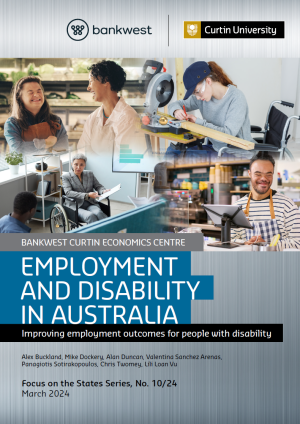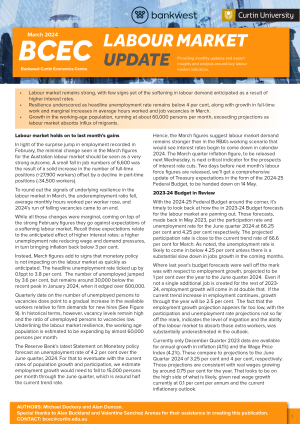Publications
Search results for
Publication Type: Working PapersX
Trust a few: natural disasters and the formation of trust in Africa
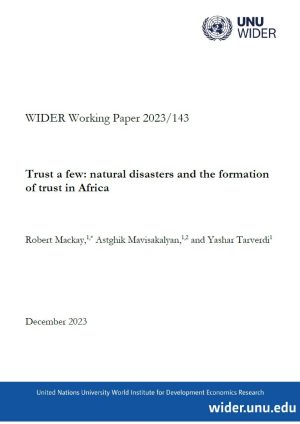 Individuals are at their most mental plasticity in their impressionable years (ages 18–25 years) forming long-term attitudes and behaviours essential to functioning in a society, such as trust. In this paper we ask how exposure to natural disasters within the... Read article
Individuals are at their most mental plasticity in their impressionable years (ages 18–25 years) forming long-term attitudes and behaviours essential to functioning in a society, such as trust. In this paper we ask how exposure to natural disasters within the... Read article
 Individuals are at their most mental plasticity in their impressionable years (ages 18–25 years) forming long-term attitudes and behaviours essential to functioning in a society, such as trust. In this paper we ask how exposure to natural disasters within the... Read article
Individuals are at their most mental plasticity in their impressionable years (ages 18–25 years) forming long-term attitudes and behaviours essential to functioning in a society, such as trust. In this paper we ask how exposure to natural disasters within the... Read article
Mining and mistrust in government
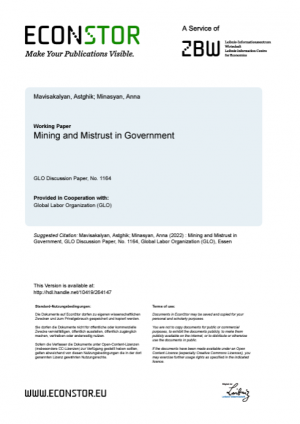 Recent research shows that natural resources can hurt institutions by promoting corruption and diverting resources from the production of public goods. This, in turn, may have implications for the trust individuals hold for their governments. We explore this possibility by... Read article
Recent research shows that natural resources can hurt institutions by promoting corruption and diverting resources from the production of public goods. This, in turn, may have implications for the trust individuals hold for their governments. We explore this possibility by... Read article
 Recent research shows that natural resources can hurt institutions by promoting corruption and diverting resources from the production of public goods. This, in turn, may have implications for the trust individuals hold for their governments. We explore this possibility by... Read article
Recent research shows that natural resources can hurt institutions by promoting corruption and diverting resources from the production of public goods. This, in turn, may have implications for the trust individuals hold for their governments. We explore this possibility by... Read article
Gendered language and gendered violence
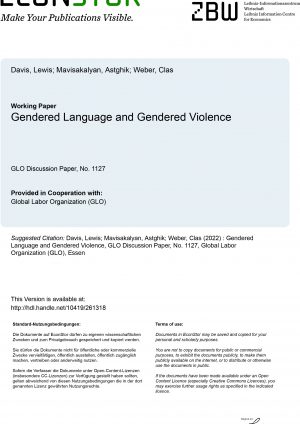 This study establishes the influence of sex-based grammatical gender on gendered violence. We demonstrate a statistically significant relationship between gendered language and the incidence of intimate partner violence in a cross-section of countries. Motivated by this evidence, we conduct an... Read article
This study establishes the influence of sex-based grammatical gender on gendered violence. We demonstrate a statistically significant relationship between gendered language and the incidence of intimate partner violence in a cross-section of countries. Motivated by this evidence, we conduct an... Read article
 This study establishes the influence of sex-based grammatical gender on gendered violence. We demonstrate a statistically significant relationship between gendered language and the incidence of intimate partner violence in a cross-section of countries. Motivated by this evidence, we conduct an... Read article
This study establishes the influence of sex-based grammatical gender on gendered violence. We demonstrate a statistically significant relationship between gendered language and the incidence of intimate partner violence in a cross-section of countries. Motivated by this evidence, we conduct an... Read article
Identity and support for policies towards Indigenous people
 This paper adds to knowledge on the role of politicians’ and voters’ identities in influencing policy-making in societies marked by ethnic inequality. The outcome we investigate is the initiatives and policies targeting Indigenous populations in the context of Australia. We... Read article
This paper adds to knowledge on the role of politicians’ and voters’ identities in influencing policy-making in societies marked by ethnic inequality. The outcome we investigate is the initiatives and policies targeting Indigenous populations in the context of Australia. We... Read article
 This paper adds to knowledge on the role of politicians’ and voters’ identities in influencing policy-making in societies marked by ethnic inequality. The outcome we investigate is the initiatives and policies targeting Indigenous populations in the context of Australia. We... Read article
This paper adds to knowledge on the role of politicians’ and voters’ identities in influencing policy-making in societies marked by ethnic inequality. The outcome we investigate is the initiatives and policies targeting Indigenous populations in the context of Australia. We... Read article
Changing demand for STEM skills in Australia and gender implications
 A method is developed for measuring the intensity with which skills in science, technology, engineering and mathematics (STEM) are used in different occupations based on workers’ field of qualification and weighted by the wage premium associated with their level of... Read article
A method is developed for measuring the intensity with which skills in science, technology, engineering and mathematics (STEM) are used in different occupations based on workers’ field of qualification and weighted by the wage premium associated with their level of... Read article
 A method is developed for measuring the intensity with which skills in science, technology, engineering and mathematics (STEM) are used in different occupations based on workers’ field of qualification and weighted by the wage premium associated with their level of... Read article
A method is developed for measuring the intensity with which skills in science, technology, engineering and mathematics (STEM) are used in different occupations based on workers’ field of qualification and weighted by the wage premium associated with their level of... Read article
Female autonomy in household decision-making and intimate partner violence: Evidence from Pakistan
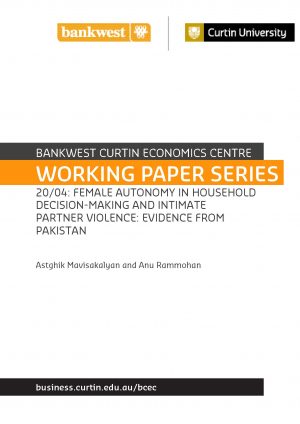 The aim of this study is to explore the links between female autonomy in household decision-making and intimate partner violence in a highly relevant yet under-studied context: Pakistan. Using a nationally representative dataset, and employing matching and partial identification estimation... Read article
The aim of this study is to explore the links between female autonomy in household decision-making and intimate partner violence in a highly relevant yet under-studied context: Pakistan. Using a nationally representative dataset, and employing matching and partial identification estimation... Read article
 The aim of this study is to explore the links between female autonomy in household decision-making and intimate partner violence in a highly relevant yet under-studied context: Pakistan. Using a nationally representative dataset, and employing matching and partial identification estimation... Read article
The aim of this study is to explore the links between female autonomy in household decision-making and intimate partner violence in a highly relevant yet under-studied context: Pakistan. Using a nationally representative dataset, and employing matching and partial identification estimation... Read article
Household density and children’s wellbeing in Australia: Are children’s homes too empty?
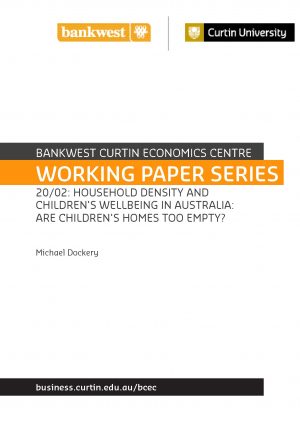 Living in crowded housing has been associated with poorer physical and mental health outcomes, with a greater emphasis on the psychological effects when the underlying quality of housing is high. Hence ‘overcrowding’ features as a housing condition extensively studied in... Read article
Living in crowded housing has been associated with poorer physical and mental health outcomes, with a greater emphasis on the psychological effects when the underlying quality of housing is high. Hence ‘overcrowding’ features as a housing condition extensively studied in... Read article
 Living in crowded housing has been associated with poorer physical and mental health outcomes, with a greater emphasis on the psychological effects when the underlying quality of housing is high. Hence ‘overcrowding’ features as a housing condition extensively studied in... Read article
Living in crowded housing has been associated with poorer physical and mental health outcomes, with a greater emphasis on the psychological effects when the underlying quality of housing is high. Hence ‘overcrowding’ features as a housing condition extensively studied in... Read article
Paradise Postponed: Future Tense and Religiosity
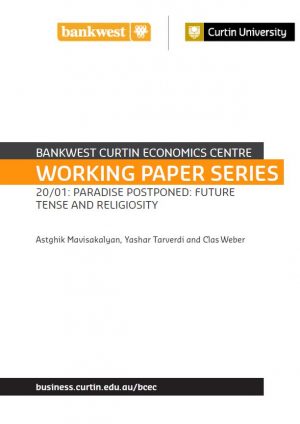 This paper identifies a new source of differences in religiosity: the presence of future tense marking in language. We argue that the rewards and punishments that incentivise religious behaviour are less effective for speakers of languages that contain future tense... Read article
This paper identifies a new source of differences in religiosity: the presence of future tense marking in language. We argue that the rewards and punishments that incentivise religious behaviour are less effective for speakers of languages that contain future tense... Read article
 This paper identifies a new source of differences in religiosity: the presence of future tense marking in language. We argue that the rewards and punishments that incentivise religious behaviour are less effective for speakers of languages that contain future tense... Read article
This paper identifies a new source of differences in religiosity: the presence of future tense marking in language. We argue that the rewards and punishments that incentivise religious behaviour are less effective for speakers of languages that contain future tense... Read article
Can bribery buy health? Evidence from post-communist countries
 Corruption is pervasive, but we know little about its effects on individual lives. This paper examines whether living in a corrupt society has deleterious effects on health. Using individual-level data from 28 post-communist countries, we demonstrate that bribing for public... Read article
Corruption is pervasive, but we know little about its effects on individual lives. This paper examines whether living in a corrupt society has deleterious effects on health. Using individual-level data from 28 post-communist countries, we demonstrate that bribing for public... Read article
 Corruption is pervasive, but we know little about its effects on individual lives. This paper examines whether living in a corrupt society has deleterious effects on health. Using individual-level data from 28 post-communist countries, we demonstrate that bribing for public... Read article
Corruption is pervasive, but we know little about its effects on individual lives. This paper examines whether living in a corrupt society has deleterious effects on health. Using individual-level data from 28 post-communist countries, we demonstrate that bribing for public... Read article
The unintended consequences of increasing returns to scale in geographical economics
 Increasing returns to scale is now fundamental to both economics and economic geography. But first generation theories of endogenous growth imply an empirically-refuted scale effect. This scale effect and assumptions to negate the scale effect both imply unintentional spatial consequences.... Read article
Increasing returns to scale is now fundamental to both economics and economic geography. But first generation theories of endogenous growth imply an empirically-refuted scale effect. This scale effect and assumptions to negate the scale effect both imply unintentional spatial consequences.... Read article
 Increasing returns to scale is now fundamental to both economics and economic geography. But first generation theories of endogenous growth imply an empirically-refuted scale effect. This scale effect and assumptions to negate the scale effect both imply unintentional spatial consequences.... Read article
Increasing returns to scale is now fundamental to both economics and economic geography. But first generation theories of endogenous growth imply an empirically-refuted scale effect. This scale effect and assumptions to negate the scale effect both imply unintentional spatial consequences.... Read article
A multi-sector model of relatedness, growth and industry clustering
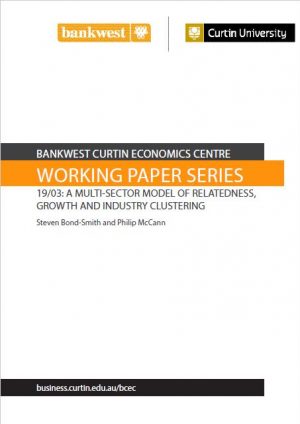 This article builds an understanding of regional innovation specialization by developing a multi-sector model with endogenous growth through quality improving innovations and spillovers from related technologies. The model provides an approach to incorporate the relatedness literature within the mainstream theoretical... Read article
This article builds an understanding of regional innovation specialization by developing a multi-sector model with endogenous growth through quality improving innovations and spillovers from related technologies. The model provides an approach to incorporate the relatedness literature within the mainstream theoretical... Read article
 This article builds an understanding of regional innovation specialization by developing a multi-sector model with endogenous growth through quality improving innovations and spillovers from related technologies. The model provides an approach to incorporate the relatedness literature within the mainstream theoretical... Read article
This article builds an understanding of regional innovation specialization by developing a multi-sector model with endogenous growth through quality improving innovations and spillovers from related technologies. The model provides an approach to incorporate the relatedness literature within the mainstream theoretical... Read article
The decades-long dispute over scale effects in the theory of economic growth
 The so-called ‘new growth theory’ is characterized by the now Nobel Prize winning insight that ideas are a non-rival input to and output from endogenous investment in innovation. Non-rivalry implies increasing returns to scale, but this also unintentionally creates an... Read article
The so-called ‘new growth theory’ is characterized by the now Nobel Prize winning insight that ideas are a non-rival input to and output from endogenous investment in innovation. Non-rivalry implies increasing returns to scale, but this also unintentionally creates an... Read article
 The so-called ‘new growth theory’ is characterized by the now Nobel Prize winning insight that ideas are a non-rival input to and output from endogenous investment in innovation. Non-rivalry implies increasing returns to scale, but this also unintentionally creates an... Read article
The so-called ‘new growth theory’ is characterized by the now Nobel Prize winning insight that ideas are a non-rival input to and output from endogenous investment in innovation. Non-rivalry implies increasing returns to scale, but this also unintentionally creates an... Read article

